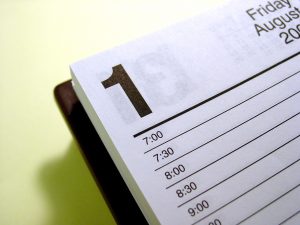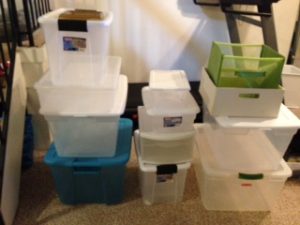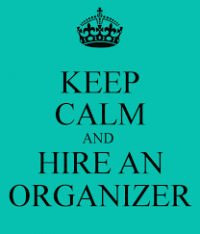 Do you struggle trying to accomplish everything you want to get done in a week? Are you always asking yourself “where does the time go?” Are you always running late for appointments? Instead of trying to keep it all organized in your head, start a time management system for yourself by using a calendar (digital or paper, whatever your preference), a Day-Timer, or even an excel spreadsheet will work.
Do you struggle trying to accomplish everything you want to get done in a week? Are you always asking yourself “where does the time go?” Are you always running late for appointments? Instead of trying to keep it all organized in your head, start a time management system for yourself by using a calendar (digital or paper, whatever your preference), a Day-Timer, or even an excel spreadsheet will work.
Remember school schedules? The week is scheduled by the day, classes with start and end times are filled in first and the remaining time is what you have left for the week. Start with your non-flexible commitments, such as; work, and then plan the other activities or tasks by the days and times available in the space you have left. Block out the amount of time each commitment, task, or activity will take and include travel time if necessary. This will visually put your time available to accomplish your tasks for the week “at a glance” and into perspective. This is imperative for getting a handle on your time management schedule. If there are overlapping commitments and a shortage of time available to get everything accomplished, you know it’s time to reorganize your week.
Keep in mind, you do need to sleep, so only schedule your time during your realistic waking hours. Each day follow your day’s schedule of events to know where you have to be and when. Then when emergencies crop up and they will, you will have a much better handle on where to reschedule the lessor priorities.
Don’t overbook yourself. Be realistic, allow for travel time and most importantly, don’t forget to allow for “down-time”!
Click on the title above to learn more about the featured author.
 The first day of Fall is September 22. Work and school are back in full swing. Managing your to-dos effectively is essential to maximizing your productivity at home and work.
The first day of Fall is September 22. Work and school are back in full swing. Managing your to-dos effectively is essential to maximizing your productivity at home and work.
A while ago I gave a presentation called “Stop Mumbling, Oops, I Forgot: How to Effectively Manage Your To-Dos.” With good intentions, people say they’ll do something but then forget because it wasn’t noted somewhere. People waiting for the promised ‘something’ to be done are disappointed. At work, this is a particularly bad practice. A good practice is to make notes on your to-do list or calendar so tasks are not forgotten.
Even with the best systems, life sometimes gets in the way. As John Lennon said, “Life is what happens to you while you’re busy making other plans.”
Case in point: I received an email from an attendee the next day. “My kids need completely different school supplies than what we bought, my husband suddenly needs to take his car into the shop, mom’s aide left early without doing the grocery shopping, and I have a report deadline at work tomorrow. How do I know what to do first?” Let’s call her Amy and her husband Michael.
I made these assumptions: The report will take Amy’s available time to complete, and Amy and Michael each need a car to get to work.
Following was my response.
First, Amy should complete the report and meet the deadline. Her job provides needed income and benefits, so she shouldn’t potentially put it at risk.
Second is Michael’s car. There are a few options. Have Michael find out if the auto shop provides a loaner car, ask someone to drive him from the shop to work (if convenient), call Uber/Lyft or wait for the car to be repaired.
Third comes food. Cereal, eggs and PB&J (or whatever is on hand) can fill bellies for a day. Other options include ordering food from a market with home delivery, ordering takeout with delivery, and asking the aide to get groceries the next time he/she’s on duty.
School supplies are fourth. Amy can order the supplies online with next-day delivery or pickup after work.
______________________________________________________________
General takeaway tips:
• Have the school provide in advance a list of needed supplies and buy them then.
• Schedule non-cancelable appointments with yourself to work on and complete reports and other important work well before the deadline to avoid a last-minute crises.
• Develop a Plan B to get to work in case of future car trouble or other emergency.
• Join AAA or another roadside-assistance plan.
• Keep the fridge and pantry stocked with essentials such as cereal, milk, bread, eggs, pasta, tuna, soup and frozen meals.
Having a contingency plan for emergency situations helps to make life less stressful. Who wouldn’t want a little less stress?
When life overwhelms you, stop and take a deep breath. Figure out what needs to be done and by when. Prioritize by most-to-least important. So, first do what needs immediate attention. If you find crisis situations happen too often, click HERE to contact a member of the Greater Philadelphia Chapter of the National Association of Professional Organizers for help.
Click on the title above to learn more about the featured author.
 Whenever I do a workshop, I am invariably asked if you have to be born with an organizing gene. Although my answer to this question is no, I do think that all of us have gifts in different areas of life, and hence, we can all learn from each other.
Whenever I do a workshop, I am invariably asked if you have to be born with an organizing gene. Although my answer to this question is no, I do think that all of us have gifts in different areas of life, and hence, we can all learn from each other.
One of the tips that I always give my clients, workshop attendees, or anyone else who has a question about organizing is NOT to buy any containers until you see what you need. Until you know what you are going to keep after sorting and purging (this includes donating, recycling, shredding, and discarding), how would you know what size container to buy, or, if you even need one? You always want to make sure it is the right size, color, and that it will fit the space.
More often than not, there will be containers left after you’ve gone through the sorting and purging steps. You would be surprised at how many you thought you needed and bought, so use those containers first. No doubt they will work if you find you need them for other items you kept to store.
Do yourself and your wallet a favor and don’t spend the time buying something that you may not need. If you do buy something and don’t use it, are you going to remember where you put the receipt? If you find the receipt, you are going to have to spend time returning the item to the store. Wouldn’t you rather spend your time and money on what you really want?
Rather than buying the product first and then trying to see if it works for what you need, figure out your need first and then decide on the solution. When was the last time an inanimate object like a basket or plastic storage container organized you?
Click on the title above to learn more about the featured author.
 When was the last time you took everything out of the trunk and off of the floor of your car and really explored what is hanging out in there? Maybe you have some store returns to make that happen to be intermixed with fallen French fries, sticky soda bottles and stinky gym shoes…ick. It sounds like a scenario for those Febreze Car Fresheners!
When was the last time you took everything out of the trunk and off of the floor of your car and really explored what is hanging out in there? Maybe you have some store returns to make that happen to be intermixed with fallen French fries, sticky soda bottles and stinky gym shoes…ick. It sounds like a scenario for those Febreze Car Fresheners!
On the next nice day when you can dedicate a few hours, head out to your car and follow these simple steps.
1) Remove EVERYTHING – Yes, I said everything! First, take out the bigger items from the floor and then the stuff from your glove compartment, center console, door pockets and trunk. Don’t forget to look in all those other nifty hidden compartments, as well. For now, keep these items in neat (or as neat as possible) piles in your garage, on the patio or in shopping bags.
2) Clean – Clean your interior windows including the front windshield, the rear window and the gauges. Next, dust and clean your dashboard. Finally, vacuum the floors and seats. If you haven’t done this process in a while, you may just prefer to head to the car wash and let them take care of it for you. A good car wash may be something worthwhile to get rid of that pesky pollen…achoo!
3) Trash/Recycle – Get a trash bag as well as another bag for recycling. Toss any items that are trash, like those fries! Recycle any maps or papers that aren’t needed, like expired car registration or insurance documents, soda cans and water bottles.
4) Sort – Go through the rest of the items and decide where they need to go, whether it is back in the car or into your house.
5) Organize – Keep some fabric storage bins with handles in your trunk and on the backseat. They are inexpensive and can surprisingly hold a lot. Five bins should be enough; you don’t want to fill up your entire car with them.
6) Maintain – Whenever you stop for gas, pop out the trash bag and toss it. Save the recycling items to take home if you don’t see a recycling bin. Keep some additional plastic grocery bags folded flat on the bottom of each bin.
7) Rejoice! – Look inside your newly cleaned car and get ready for those road trips. Then take a whiff. If it still stinks, quickly proceed to the nearest store and buy yourself an air freshener!
Happy travels wherever you are headed, near or far!
Click on the title above to learn more about the featured author.
 Have you considered hiring a professional organizer but for one reason or another decided against it? You are not alone! Many people think that hiring someone to get or keep them organized is foolish and unnecessary. The reality is, this couldn’t be further from the truth! Professional Organizers are here to help you get your home in order, in a way that works best for your lifestyle.
Have you considered hiring a professional organizer but for one reason or another decided against it? You are not alone! Many people think that hiring someone to get or keep them organized is foolish and unnecessary. The reality is, this couldn’t be further from the truth! Professional Organizers are here to help you get your home in order, in a way that works best for your lifestyle.
Just as many people outsource their house cleaning and lawn maintenance. Hiring an organizer can save you time, aggravation, and money. So…why are people so reluctant to hire an organizer?
I CAN DO THIS MYSELF!
This is perhaps the most common reason people are reluctant to hire a professional organizer. Yes, you can do it yourself, but…will you? How long have you been talking about organizing your basement, attic, garage, or closets? How many times have you started the project then stopped because you got overwhelmed or frustrated?
A professional organizer can help you through the organization process. The first thing I do when I connect with a new client is listen to what they want. Together, we make an action plan. I guide clients through the process from start to finish, help them decide what stays and what goes, and provide support and guidance for maintaining organization.
With a professional by your side, your organizing project will get finished in a timely manner leaving your space feeling rejuvenated and refreshed!
I’M GOING TO HAVE TO GET RID OF EVERYTHING!
No, you won’t. Professional organizers are not heartless people who feel as though purging is the only way to get you back on track. Our job is to listen to you, to offer support and guidance, and to help you make the best decisions based on how you live, and how you want to live your life. The final decision on whether to keep, donate, or toss items is always up to you, and you will never have to lose anything you care deeply about.
When you make the choice to donate, professional organizers can offer suggestions on the best options for donating useable goods to local organizations who need what you no longer want. When something cannot be reused, a professional can help you to use environmentally conscious practices for recycling and disposal.
I’M GOING TO HAVE TO SPEND SO MUCH MONEY!
Hiring a professional organizer is an investment – an investment in your home, your quality of life, and your time. Hiring an organizer provides you with a valuable service that improves your quality of life. When you become organized, you’ll find that you are less stressed and have more time in your day because it’s easier locating the items you need, when you need them.
Once you begin the organization process, and you use what you already have to organize your belongings, you’ll discover that you have more closet, cabinet, and shelf space than you knew! If you should need to purchase items such as bins or containers, a professional organizer can make recommendations based on what will work best for you and your space.
So, why not make the call today and hire a professional organizer?
Being a “baby boomer” with aging parents (we don’t use the “O” word) is a challenge. Someone has to manage their finances, medical care, etc., in addition to managing their own lives. Some people transition into this next phase easily, while others may struggle. My mother-in-law blossomed when she moved into a continuing care community. All the people, the activities, and the fine meals prepared there… visiting her seemed like geriatric camp.
The beginning
The ideal situation is when parents make the decision to plan ahead, before something “happens.” They will have a say on how things will unfold and won’t be feeling left stuck. Communication is key. Remember, this is a huge life change for them so check your ego at the door. If you can’t communicate, get a mediator to help you through the process.
What if they don’t want to move?
The longer our parents wait or the more they postpone the process, the harder it will be. Period. As children, we can be a blessing and a curse. They want us there, but they don’t want our opinions. Personally, I was not invited to help my mother when she downsized. It was emotional and difficult to understand. I, the expert, was banned from doing what I do best.
Avoid crisis
Don’t wait for a crisis to happen; being prepared for every scenario is key. Think about the worst case and consider all the events that will follow: transportation, after care, meal preparation, hygiene and so on. These are all possible circumstances that will need to be addressed after a crisis. Once you are in the crisis, things move very quickly. This can be very disorienting and stressful for your parents (and you too).
Where to go?
Transition is hard for everyone. Finding the right place will give your loved ones peace of mind and security. A member of my family couldn’t return home and moved to a facility that was chosen by their kids. It was ok, but the quality of care quickly declined. This resulted in moving an 85-year-old with Parkinson’s twice within a few years. Very disorienting.
How a facility is managed can tell you a lot. For my mother, we opted for a place that is managed by the community or a residents board of directors.
What about the stuff? Where do you start with a lifetime of possessions?
Start as soon as possible. What does that mean? As soon as your parents start warming up to the idea of moving, talking about moving, or looking at new places, begin to sort.
Implement deadlines. Set a goal of when decisions need to be made, and if the deadline passes, the stuff goes into the trash or a donation bin. Start in the attic, basement or garage. The big things are easy (we call this cherry picking)— extra furniture, appliances, or things they no longer use. Then shift into the smaller items, like things they will no longer need in their new place: bikes, shovels, tools, etc., can all go…
Excess items are easy to let go. In a small space, you will only need so many household goods. Entertainment items can be paired down to just the basics.
Kids, our parents are not responsible for our stuff from high school and college. Help them make the decision to let go of your old things.
Emotional items are more difficult. It’s ok to leave those to the end. Pick your battles and make realistic decisions. Small stuff is good, but the bigger stuff might be more difficult. Find a balance.
To store or not to store?
The storage decision is hard. Be realistic on what you need to store. I have a client who has spent $50K on storage since her dad died. I am sure that what is in there is not worth the storage cost.
The only time I recommend storage is if there is no way you can get your parents to change their minds. Have the hard conversation, but know that sometimes it’s not worth the battle.
If it’s a non-negotiable decision, respect your parent’s choice. It’s okay to revisit the conversation later. Suggest going through the unit in six months. They might feel better about making decisions once they have settled into the new space and relaxed.
My number one word of wisdom is— do not bring everything to your house to sort! Too many people have called me with a basement or a garage full of their parent’s things. My aunt died thirteen years ago, at the last minute we packed a couple of boxes to sort through at my mother’s house… they are still there.
This is a difficult time for everyone. We need to drive the process, learn to listen and be supportive while maintaining a good relationship with our parents.
Click on the title above to learn more about the featured author.